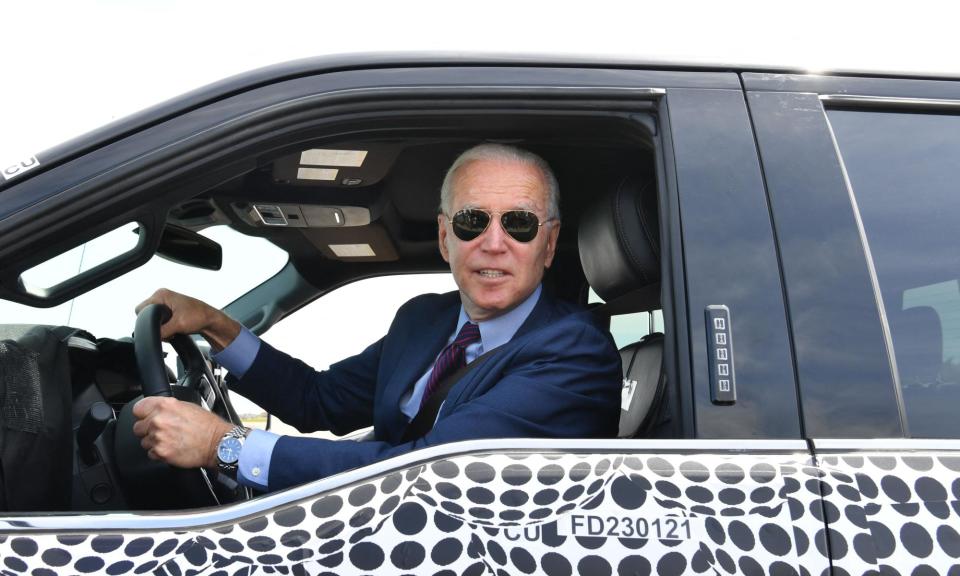Ford chief says Americans need to fall ‘back in love’ with smaller cars

It is time for the US to “get back in love” with smaller cars, according to the chief executive of Ford.
In a wide-ranging interview at the Aspen Ideas festival, Jim Farley said the auto industry needs to focus on smaller EVs and commercial vehicles. He acknowledged that American consumers are in “love with these monster vehicles” but said they need to “get back in love” with small cars.
“We have to start to get back in love with smaller vehicles. It’s super important for our society and for EV adoption,” Farley said. “We are just in love with these monster vehicles, and I love them, too, but it’s a major issue with weight.”
The average weight of a new vehicle sold in the US last year was 4,329lbs (2,000kg) – an increase of 1,000lbs (450kg) from 1980.
Ford expects to introduce a $30,000 all-electric vehicle that will be profitable in roughly two and a half years, breaking a price barrier that has made the adoption of EVs an unobtainable luxury to all but the auto industry’s wealthiest customers.
Farley told the festival last week that the company’s new EV vehicle would be a competitor of China’s BYD, which the Biden administration is looking to effectively ban from the US market by quadrupling import tariffs. It would also rival a new, entry-level electric car from the US maker Tesla, expected next year.
Farley said Ford would focus on the new vehicle – not larger all-electric trucks and SUVs. Larger vehicles, using internal combustion engines, have traditionally driven US carmakers’ profits, especially at Ford.
“You have to make a radical change as an [automaker] to get to a profitable EV. The first thing we have to do is really put all of our capital toward smaller, more affordable EVs,” Farley said during an interview with CNBC’s Julia Boorstin.
“That’s the duty cycle that we’ve now found that really matches. These huge, enormous EVs are never going to make money: the battery is $50,000, even with low-nickel, LFP chemistry. They will never be affordable.”
A Ford spokesperson clarified that he was referring to the company’s Super Duty models, which require massive battery packs to achieve ranges of 500 miles, and are said to be heavier than a Honda Civic.
But he said the stakes are high for Ford and the other automakers over the next five years, as they seek to compete with Chinese EV makers. Farley said it was crucial for Ford, which lost $132,000 on every EV sold in the first three months of the year, to make profitable EVs in the next five years.
“If we cannot make money on EVs, we have competitors who have the largest market in the world, who already dominate globally, already setting up their supply chain around the world,” Farley said. “And if we don’t make profitable EVs in the next five years, what is the future? We will just shrink into North America.”
Last month, the Biden administration announced it would place a 100% tariff on Chinese-made EVs, which can retail for as little as $10,000 – far less than the average $53,000 in the US. The move was interpreted as a political gesture to protect US auto-industry jobs in critical election swing states of Pennsylvania and Michigan.
“For too long, China’s government has used unfair, non-market practices,” the administration said, adding that the action against Chinese EVs was designed to ensure “the future of the auto industry will be made in America by American workers”.
But the Atlantic Council warned that Biden’s electric vehicle tariff strategy is “not likely to change Chinese behavior” unless it is shared by G7 allies.
“The United States can impose high electric vehicle tariffs because China only represents 1-2% of the US EV imports. By contrast, EVs from China already comprise over 20% of Europe’s EV imports, making tariffs more likely to raise costs for consumers,” the council said.

 Yahoo Finance
Yahoo Finance 